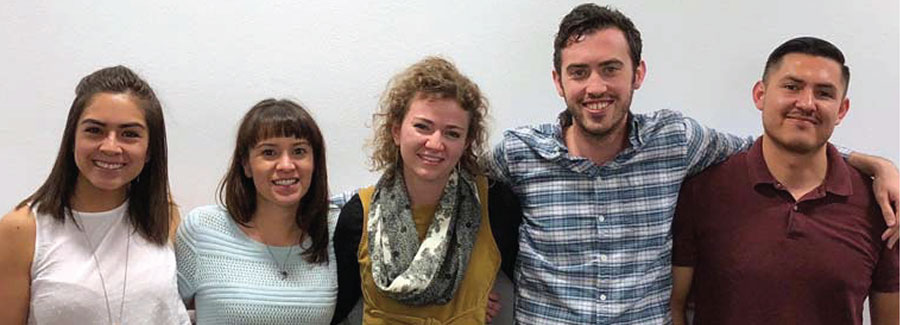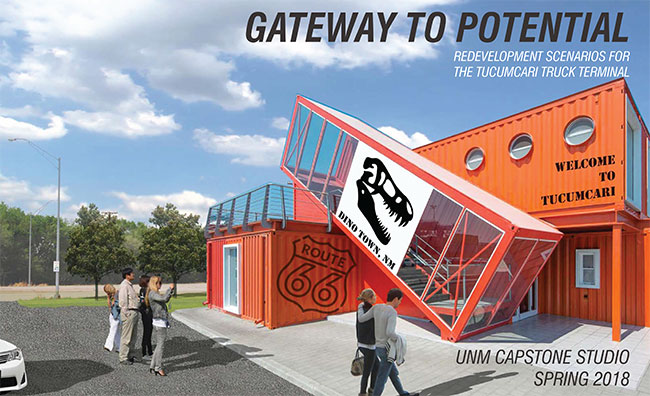
Gateway to Potential: Redevelopment Scenarios for the Tucumcari Truck Terminal
Spring 2018

PROGRAM: Master of Community and Regional Planning
STUDENTS: Angela Archibeque, Omega Delgado, Brandon Howe, Kate McMath, Curtis Sanders
INSTRUCTORS: Moises Gonzales and Joni Palmer, PhD
Economic development related to the remediation of brownfield sites is a phenomena associated within the InterMountain west region and other rural towns across America. After conducting site inventory and analysis and engaging with the community, students proposed three scenarios for redevelopment: an Active Rest Stop, “ Back to the Future” Drive-in, and Eco Energy Park.
Environmental remediation of brownfield sites has become common among rural communities in the rural Intermountain West and across the country. West of Tucumcari, NM is a site that once functioned as a drive-in theater, then a truck terminal, but now remains vacant after the new owners did not redevelop the site. After years of vacancy, the Ortega family agreed to donate the property to the City of Tucumcari. After consultation of the Environmental Protection Agency through the Tucumcari Economic Development Corporation, the EPA classified the 22-acre site as a brownfield which would require remediation before redevelopment can occur.
Over the course of the semester, students carried out the process of analyzing and formulating a long-term plan using this process:
- Site analysis of history
- Existing conditions analysis for the city of Tucumcari
- Identified and mapped regional assets in Health, Education, Energy, and Tourism
- Conducted a community visioning workshop
- Analyzed community input and formulated a redevelopment matrix
- Developed and crafted three proposed redevelopment scenarios
- Conducted a secondary community meeting for feedback on redevelopment scenarios
- Developed a final report outlining research, scenarios, and recommendations
After conducting this process, the studio provided Tucumcari with three redevelopment scenarios that reflect the city’s assets, needs, and community vision. Each scenario presents varying levels of redevelopment intensities and reflects different aspects of the community’s past, present, and potential future.
First, students proposed a visitor center with interactive public art installations, a trail network, and overnight parking. This scenario is relatively low-intensity and provides health benefits to both travelers and the community. With this scenario, the city could continue to use the site for its original use--a visitor’s center and rest stop--while introducing a new health initiatives through providing cultural and recreational amenities.
The second scenario proposes an entertainment center with drive-in theater/flex space, commercial development, and paintball course. This scenario is considered medium intensity intended for residents, visitors, and travelers. Through tourism and entertainment, the site can provide space for a variety of events, festivals, and gatherings for all.
The third scenario proposes a renewable energy eco-campus with solar farm, wind turbines, and greenhouse. This high intensity development will provide clean energy to Tucumcari and help the city capitalize upon the growing alternative energy industry, generating job growth, and providing renewable energy for their residents. Through partnership with Mesaland Community College, this scenario presents an opportunity for further investment into alternative energy. Along with scenario recommendations, the studio also recommends further investigation into resources needed to remediate site prior to redevelopment.
After completing the planning process, the class presented the City of Tucumcari a final report for future redevelopment consideration.
This studio was awarded the Student Project of the Year by the American Planning Association- New Mexico Chapter at the APA-NM 2018 conference.
View the full report.
